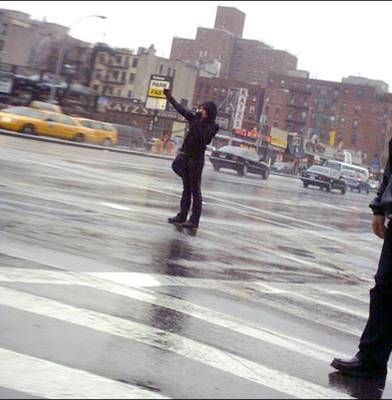Two weeks ago, in Washington, D.C., I tried Uber for the first time -- the driver was pleasant, his car clean... way better than your typical D.C. cab. The driver told me that my rating at the end of the ride is critical -- he would get disqualified if his combined review falls below 4.5. Then I noticed he rated me as well. People are being quantified in life now more than ever before and more than we know it. When you are rating your Uber driver, you are measuring your experience as a customer... but guess what, that Uber driver, or the AirBnB host, is also rating you, the consumer of the service.
This brings two implications. First, it makes common sense to be a normal "people person" when dealing with others. The alternative is to get stuck in the rain because Uber drivers don't want to deal with you. And second implication is that it makes sense to actually know yourself, especially with respect to qualities that you consider part of your real-life identity.
Just in the U.S., there are 95 million of us in the digital generation, and every day we are either asked directly or being judged on what we are good at, why people should hire us, why people should date us. In response, we convey a desired representation of ourselves -- through digital footprints, paper resume, online resume, professional profiles, etc.
But is this representation accurate? The science says it isn't so. Consider that 62 percent of people rate themselves above average on humor, grammar and logic (Joyce Ehrlinger and David Dunning, Cornell University, 2003), and 85 percent think they are above average when getting along with others. At work, we rate ourselves as above average leaders 70 percent of the times (Mark Alicke and Olesya Govorun, Psychology Press, 2005). There is even a concept called illusory superiority, also known as above average effect -- and this positive illusion is hurting our ability to recognize blind spots and reach success.
If you agree that by and large people are pretty lousy self-evaluators, then my argument is simple: The best way to increase self-awareness is through feedback from peers whose opinion you trust. Armed with relevant knowledge, it becomes easier to make decisions in the context of new and ongoing opportunities, and it becomes consequential to change aspects of yourself where it matters most.
Awareness is confidence -- knowledge of your true abilities so you can make smarter decisions and be able to live with the outcomes. Awareness is self-knowledge through the third-person perspective and also ability to transcend into a third-person perspective when dealing with others. It is the foundation of wisdom. We aim to be aware of ourselves and others around us, yet it is the skill that is often overlooked and underdeveloped.
If awareness is important to get a ride or rent an apartment, imagine how important this skill becomes in getting a job and moving forward on the job. Gaps of awareness here are scary. McKinsey found that youth, employers, and educators have sharply different perspectives on skills and work readiness: 72 percent of educators were confident that their graduates were adequately prepared for the workforce, but less than half of employers and graduates agreed.
Once on the job, Gallup found that two out of three employees are not engaged -- presumably because their self-perceived skills are not aligned with reality or their personal metrics of success are not aligned with the team or company they join. These gaps of awareness are causing companies real economic losses in higher turnover and lost productivity, and solving them is what McKinsey predicts will achieve a "dramatic liftoff effect" for the U.S. economy growth, worth $265 billion as an industry.
The good thing is that in the age of digital, gaining relevant "contours of reality" about self can become a more focused, results-oriented mission. As our digital communication style evolves from a monologue (sharing, posting) into a dialogue, so does our ability to discover how the way we see ourselves compares to the way trusted peers/friends actually see us in real life. Motivated by a basic human instinct to understand what others think about us, and applied in context to our individual sources of anxiety and growth, trusted feedback can help us improve where it matters most.
So next time you read a story decrying the millennial impulse to cast away ignorance in the pursuit of public exposure, consider this: It may be evolutionary. In the face of a job market that is increasingly uncertain, we need the unvarnished feedback of our peers more than ever. The more we know about ourselves, the better prepared we are to chart our own course.
